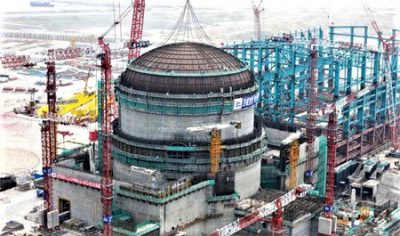Further Problems with the European Pressurised Nuclear Reactor

The Times reports that the European Pressurised Reactor (EPR) designed by the French company Areva and constructed by China General Nuclear Power Corporation (GCN) with EDF in southern China, has had another setback. The deaerator in Taishan1’s reactor, which removes oxygen and other gases from boiler feedwater circuits, cracked during performance testing due to defective welding.
The $8.7 billion Taishan 1, which will be the world’s first functioning example of the European reactor, was due to be finished last year but has been delayed by safety concerns.
According to Power Engineering International the defects found this week had been known to the manufacturer since 2012. The welding defects in a deaerator used in unit 1 of China CGN’s 3.5 GW Taishan plant had been flagged up in 2012 by an engineer at manufacturer Harbin Boiler, according to a report in the Hong Kong Free Press, The technical report in the Chinese journal Guolu zhizao (Boiler Manufacturing) said that because Chinese welding techniques do not follow the procedures required by European-designed deaerators, gaps are left between deaerator parts which need additional work before on-site assembly.
Work on a similar EPR reactor at Olkiluoto in Finland began in 2005 and it was supposed to be operational in 2009. It is now expected to be finished 2019. EDF is also building a reactor at Flamanville in Normandy which was due to begin operating in 2012. Jean-Bernard Lévy, EDF’s chief executive, now predicts that the reactor will be working by the end of 2018.
Though CGN said the deaerator has now been replaced, this is yet another concern about the two EPR reactors for Hinkley Point C in Somerset, also designed by Areva and to be built by EDF and GNC at a cost of £19.5 billion. They were expected to be operational in 2025 but EDF said this summer that they were likely to be 15 months late.
In October the Times reported that after inspectors found problems with concrete foundations laid on the Somerset coast part of the nuclear plant under construction at Hinkley Point will have to be demolished and rebuilt, commenting “the latest setback for the £20bn project”.
The problems were found in the foundations of the first of the site’s 5 miles of “galleries” — a series of deep trenches that will house the plant’s pipes and electric cables. French state-owned EDF, the owner, insisted the problem is isolated to 150 cubic metres and will not delay construction, but in July admitted that the project is now at least £1.5bn over budget and 15 months behind schedule.
A growing number will share the suspicion voiced by Jonathan Bartley, co-leader of the Green Party, that faith in the construction of Britain’s first new nuclear power plant in more than 20 years has been grossly misplaced:
“If you look at the money that’s being spent on Hinkley, some £30bn, it’s just totally uneconomic. We can create a centralised, job-poor nuclear option, which locks us into an expensive deal for decades, or we can invest in a decentralised, job-rich, clean energy renewables revolution.”
Featured image is from Nuclear Industries.

